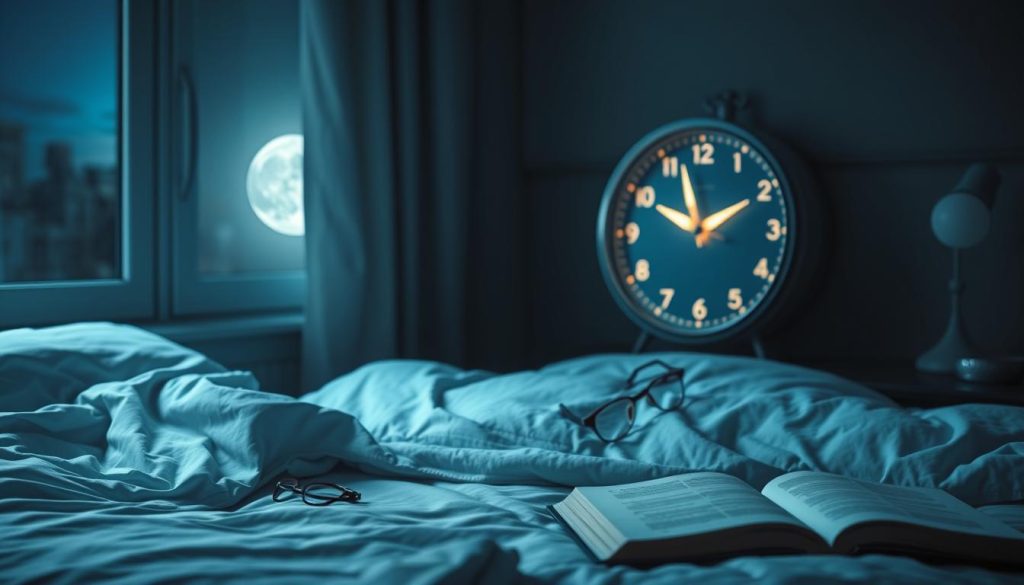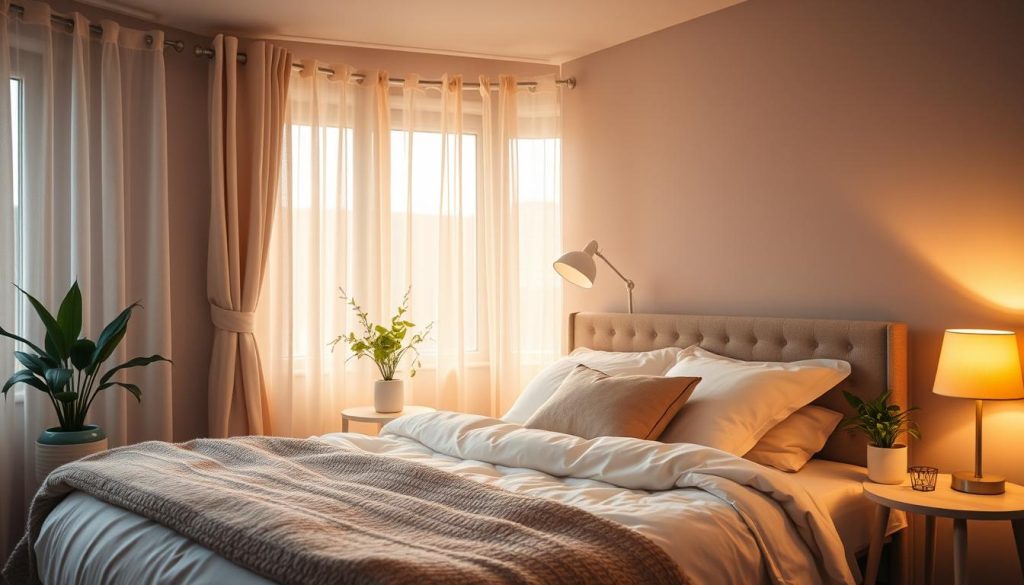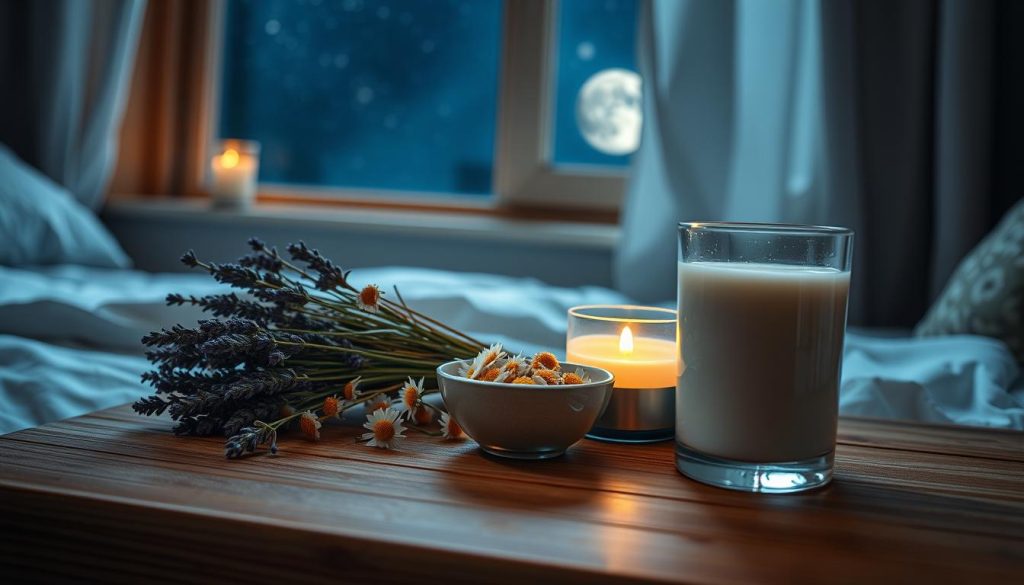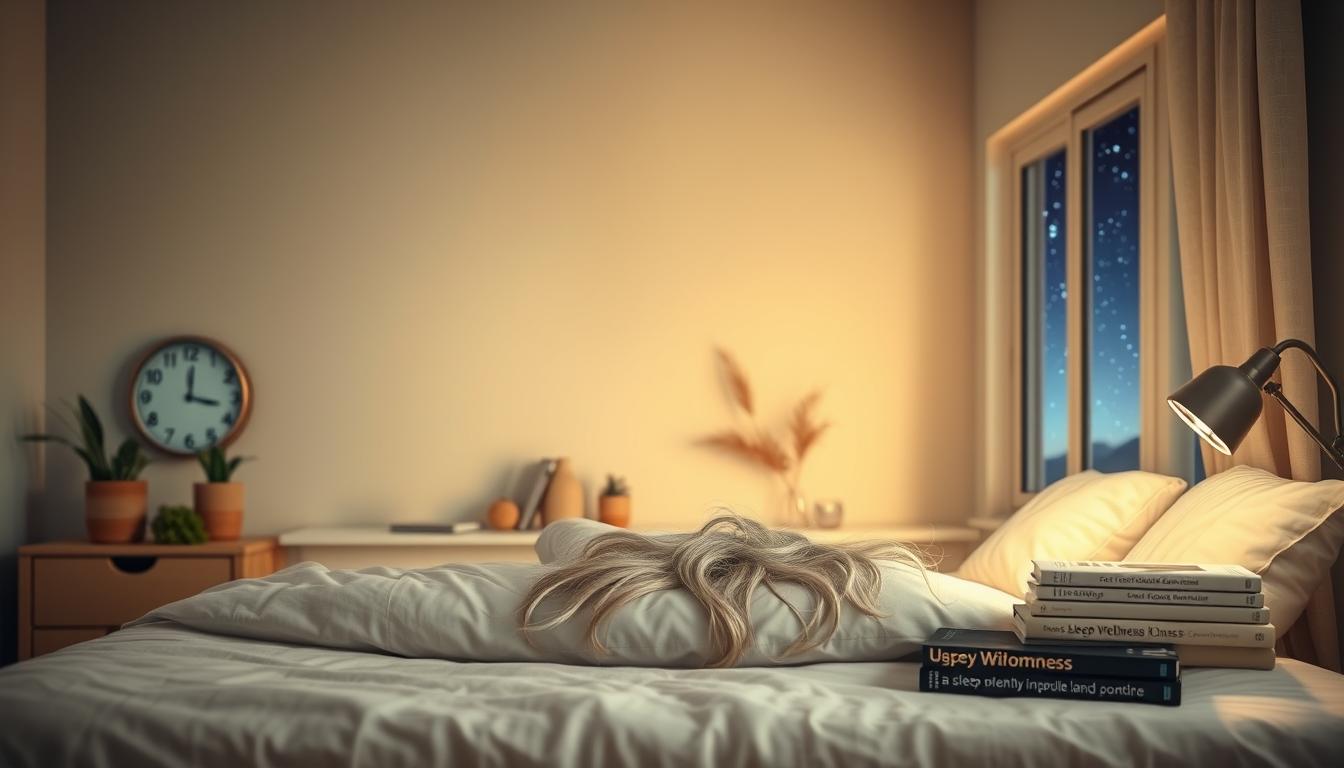As I age, I’ve learned how important sleep is for my health. Knowing my circadian rhythm helps me tackle sleep problems. It’s key to match my body’s natural clock with my daily life for better sleep.
My sleep patterns have changed, and it can be tough to keep up. But, this article is here to help. It aims to explain these changes and offer practical ways to improve my sleep.
Understanding My Circadian Rhythm
Getting to know my circadian rhythm can really help me feel better every day. It’s like an internal clock that tells me when to sleep and when to be awake. Things like light and hormones play a big part in how it works. My hypothalamus, especially the SCN, is key in keeping this rhythm in sync with the day and night.
What Is Circadian Rhythm?
The circadian rhythm is like a natural guide that tells me when to be awake and when to sleep. It affects many things in my body, like hormone levels and how hungry I feel. It helps me stay alert during the day and sleepy at night, matching the natural light cycle.
Factors Affecting My Circadian Rhythm
Many things can mess with my circadian rhythm and make it hard to sleep well. Here are some big ones:
- Light Exposure: Too much artificial light, especially blue light from screens, can mess with my natural rhythm.
- Sleep Schedule: If I don’t stick to a regular sleep schedule, it can confuse my body’s clock.
- Caffeine Intake: Drinking caffeine too close to bedtime can make it hard to fall asleep.
- Stress: Feeling really stressed can make it tough to relax and fall asleep.
| Factor | Impact on Circadian Rhythm |
|---|---|
| Light Exposure | Can delay sleep onset and disrupt sleep quality |
| Irregular Sleep Schedule | Confuses my biological clock, leading to inefficient sleep patterns |
| Caffeine Intake | Prolongs alertness at night, making rest difficult |
| Stress | Increases tension and reduces the ability to relax for sleep |
Common Age-Related Sleep Issues
As I age, I notice my sleep patterns change. Many factors lead to these changes, making sleep harder than it used to be. It’s important to understand these issues to improve my sleep quality.
Knowing the signs of sleep disorders is key to my well-being. It helps me tackle sleep problems head-on.
Why Sleep Changes with Age
My body’s changes affect my sleep as I get older. My sleep becomes more broken up. This leads to:
- Lighter sleep stages
- More night awakenings
- Less deep, restorative sleep
My hormone levels also change, especially a drop in melatonin. This affects my sleep quality. Knowing this helps me understand my sleep problems better.
Identifying My Sleep Problems
It’s crucial to know the specific sleep issues I face. Common problems include:
- Insomnia: Trouble falling or staying asleep
- Sleep apnea: Pauses in breathing during sleep
- Restless legs syndrome: Leg discomfort that disrupts sleep
Being aware of these symptoms helps me identify my sleep challenges. Once I know what I’m dealing with, I can work on improving my sleep.

Coping Strategies for Circadian Rhythm and Age-Related Sleep
Keeping a regular sleep schedule is key to managing my circadian rhythm. Going to bed and waking up at the same time every day boosts my sleep quality. Keeping a sleep diary helps me track my sleep patterns, making it easier to spot any changes.
Having a calming bedtime routine tells my body it’s time to relax. This helps me prepare for a good night’s sleep.
Maintaining a Consistent Sleep Schedule
A regular sleep schedule helps my body get into a natural rhythm. This improves my sleep hygiene. Here are some tips to keep me on track:
- Set fixed bedtime and wake-up times, even on weekends.
- Limit naps during the day to stay alert in the evening.
- Use a sleep diary to monitor my sleeping habits.
- Incorporate relaxing activities into my bedtime routine, such as reading or meditation.
Creating a Sleep-Inducing Environment
The environment where I sleep greatly affects my rest quality. Making my sleep environment better can significantly improve my sleep. Here are some tips for a better sleep environment:
- Adjust room temperature to a cool, comfortable level, ideally between 60-67°F.
- Minimize noise levels using earplugs or white noise machines.
- Invest in a comfortable bedroom setup with a supportive mattress and pillows.
- Use blackout curtains to block out light, promoting a darker sleep space.
- Ensure that electronic devices are removed from my bedroom to reduce distractions.

Natural Remedies for Better Sleep
I often look for natural ways to sleep better, avoiding medicines. Melatonin is a key natural sleep aid. It helps control my sleep cycle and can make falling asleep easier. For those with insomnia or work shifts, melatonin is a helpful option. But, I always talk to a doctor before trying any supplements.
The Role of Melatonin
Melatonin is a safe and effective hormone supplement. As I get older, my body makes less melatonin, disrupting sleep. Taking melatonin before bed helps my body know it’s time to sleep. This is great for those with insomnia.
Herbal Supplements and Their Benefits
There are also herbal supplements to help sleep. Nature has many calming herbs that improve sleep. Some popular ones are:
- Chamomile: Known for centuries as a sleep aid, often enjoyed as tea.
- Valerian Root: It has sedative effects and can help you fall asleep faster.
- Lavender: Its calming scent can make your sleep space more relaxing.
These natural sleep aids have a long history of use. They can make my sleep routine better. Adding these herbs to my sleep routine helps me relax before bed.

Lifestyle Modifications for Improved Sleep Quality
Making simple lifestyle changes can greatly improve my sleep quality. By focusing on nutrition and exercise, I can make my sleep environment better.
Nutrition Tips for Better Sleep
The connection between sleep nutrition and my health is clear. Eating certain foods can help my sleep. Here are some tips:
- Eating whole grains like brown rice and oatmeal can help make serotonin.
- Choosing lean proteins like turkey or chicken can support sleep.
- Healthy snacks like almonds or bananas before bed can improve sleep.
- Avoiding heavy meals and caffeine at night helps avoid sleep problems.
- Drinking water all day is good, but not right before bed.
Exercise’s Impact on Sleep Patterns
Regular exercise greatly improves my sleep patterns. Exercise and sleep are closely linked. Here’s how to use this to my advantage:
- Aerobic exercises like jogging, swimming, or cycling reduce anxiety and improve sleep.
- Yoga is great for relaxing my body and mind, and it helps sleep.
- Exercising in the morning or early afternoon helps my circadian rhythm. But late-night workouts can mess with my routine.
Tracking My Sleep Patterns and Progress
Understanding my sleep patterns is key to better rest. I use sleep tracking to monitor and assess my sleep health. Apps like Sleep Cycle or traditional sleep journals help me keep a detailed record of my sleep.
Having this data helps me understand what makes for a good night’s sleep. It also shows me what disrupts it. This insight is crucial for improving my sleep.
There are many ways to track sleep, and I choose what fits my lifestyle. Wearable devices like fitness trackers or smartwatches are great for ongoing sleep health checks. They track sleep quality and help spot issues like frequent awakenings.
Reflecting on my sleep data helps me make better choices for my sleep. I can adjust my bedtime, evening activities, or try relaxation practices. This way, I can see what works best for me.
Monitoring my sleep is a journey that improves my life. It’s about finding what makes my sleep better and sticking to it.

